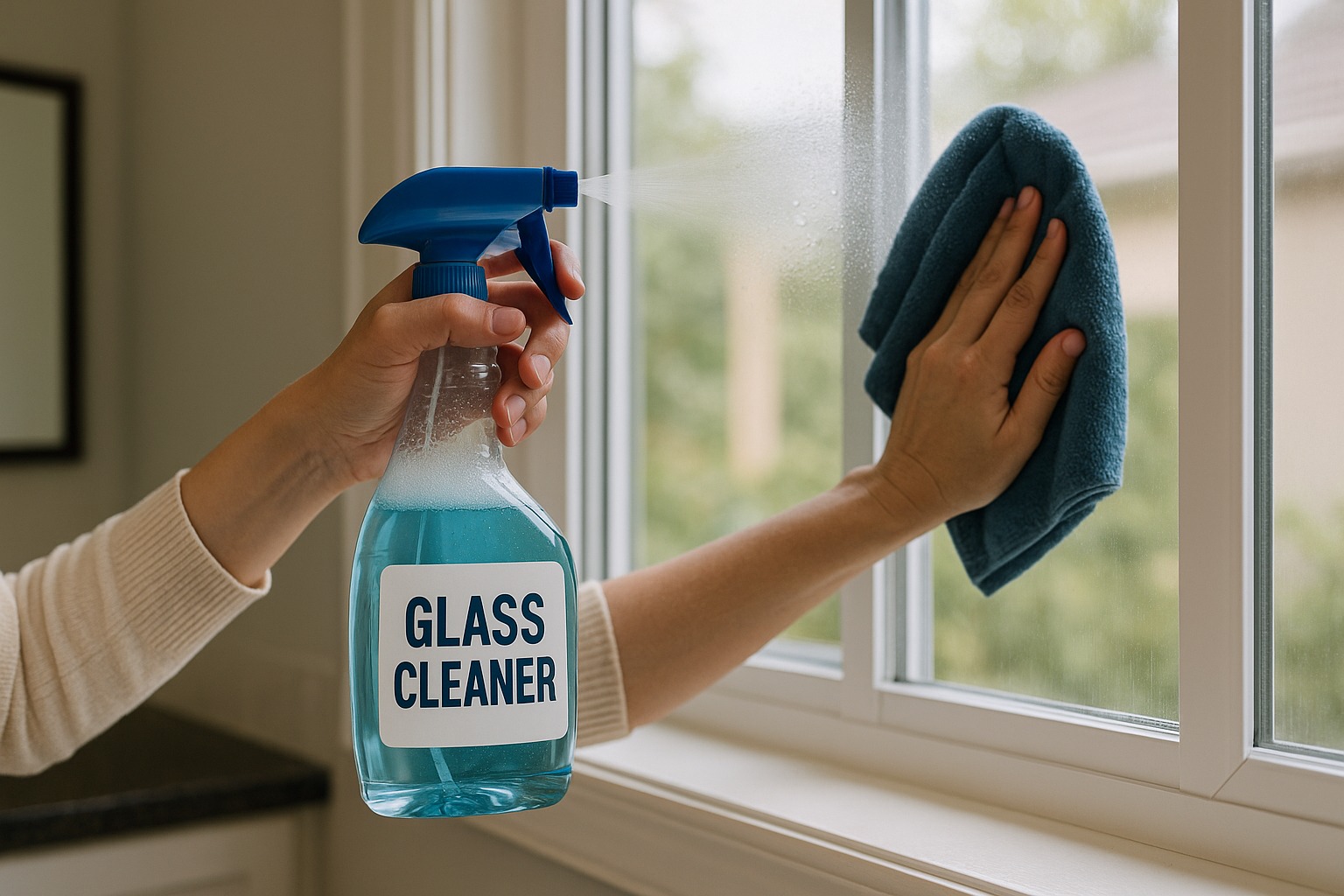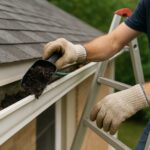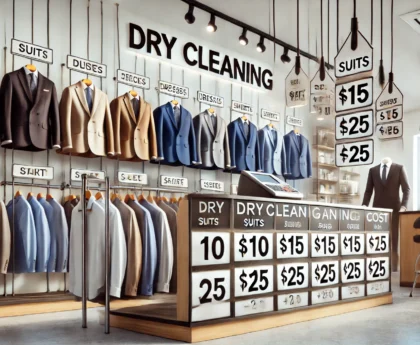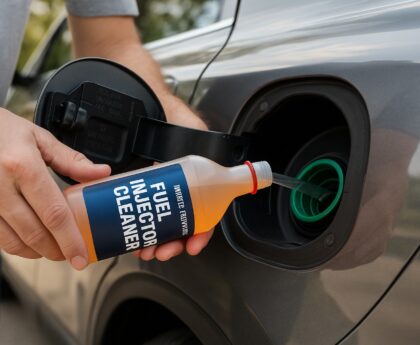When people hear the word glass cleaner, they often think of a blue liquid spray that removes fingerprints from windows. But today, the meaning goes much further. We use glass cleaners on many surfaces—mirrors in bathrooms, glass stove tops in kitchens, delicate eyeglasses, even tinted car windows. Each of these has its own needs, and not every product works safely for all.
For parents, choosing the right cleaner is more than just about having a streak-free shine. It’s about safety inside the home. Some glass cleaners contain ammonia or strong chemicals that can irritate kids and pets. Others leave a residue that might not be safe around food areas. This is why selecting a non-toxic, effective formula really matters. A good cleaner should deliver clear, sparkling glass without exposing your family to unnecessary risks.
In this article, I’ll guide you like a technician who has tested different products in the field. You’ll learn what makes a glass cleaner effective, how to recognize safe formulas, and which tools give the best results. I’ll also share insights on popular product types—from Sprayway glass cleaner to DIY solutions—and give expert tips for cleaning windows, mirrors, stove tops, and even eyeglasses.
- Understanding Glass Cleaner: Basics & Science
- Safety First: Using Glass Cleaner In Homes With Babies & Young Children
- Types Of Glass Cleaner & Their Uses
- Expert Tips & Best Practices For Using Glass Cleaner
- Common Problems & How to Deal With Them
- Natural & DIY Glass Cleaner Recipes
- Glass Cleaner Buying Guide: What To Look For
- Related Products & Services
- Cost & Value: Getting The Best For Your Budget
- Conclusion
Understanding Glass Cleaner: Basics & Science
What Makes A Good Glass Cleaner
A glass cleaner is more than just a liquid that wipes away dirt. Its strength lies in the chemistry behind it. Most cleaners contain surfactants (ingredients that break down grease and fingerprints), solvents (to help dissolve oily residues), and a balanced pH that works well on glass without damaging it.
One of the biggest challenges is achieving a streak-free finish. Streaks often happen because of tiny films left behind—either from hard water minerals, leftover soap, or excess product that doesn’t evaporate cleanly. A good cleaner is designed to dry quickly, lifting dirt while leaving nothing behind.
There’s also the question of ammonia vs. ammonia-free formulas. Ammonia is powerful for cutting grease and evaporates fast, which helps prevent streaks. But it comes with strong fumes that can irritate sensitive lungs, pets, and children. Ammonia-free cleaners rely on alcohols or plant-based agents, which are gentler and safer for indoor air quality while still giving a clear shine.
In short, a good glass cleaner should:
- Remove dirt, oils, and fingerprints effectively
- Dry quickly without streaks
- Be safe for the surfaces you use it on
- Provide a balance between power and safety, especially in family homes
Common Ingredients And What To Watch Out For
When choosing a glass cleaner, it helps to understand the ingredients listed on the label. Here are some of the most common ones and what they mean for your home:
- Ammonia – Highly effective at cutting grease and drying fast. But the strong odor can irritate eyes, lungs, and sensitive skin. Not recommended around babies, pets, or poorly ventilated areas.
- Alcohols (like isopropyl or ethanol) – Help glass dry streak-free and fight bacteria. Safer than ammonia in most cases, but still flammable and drying to skin.
- Volatile Organic Compounds (VOCs) – Found in some fragrances or solvents, VOCs can lower indoor air quality and trigger headaches or allergies in sensitive people.
- Fragrances – Added for a “fresh” smell, but they can hide chemicals that may cause irritation. Unscented or naturally scented cleaners are safer.
- Bleach or chlorine mixes – Rare in glass cleaners, but sometimes used in multipurpose sprays. These should be avoided on glass because they corrode surfaces and release harsh fumes.
Toxicity Risks
The main risks come from direct contact or accidental ingestion. Children may put fingers or cloths in their mouths after touching freshly cleaned surfaces, and pets can lick glass doors or windows. Exposure can cause:
- Eye and skin irritation
- Respiratory discomfort from fumes
- Stomach issues or poisoning if swallowed
That’s why it’s important to always store cleaners out of reach and use them with proper ventilation.
Safer Alternatives
Today, many families prefer eco-friendly or plant-based glass cleaners. These use natural surfactants from coconut or corn, combined with vinegar or essential oils for cleaning power. They reduce exposure to toxic chemicals while still giving reliable results. For those who like DIY solutions, simple mixes like vinegar and water or rubbing alcohol with water can work just as well for everyday cleaning.
Safety First: Using Glass Cleaner In Homes With Babies & Young Children
Storage And Handling
When there are babies or toddlers in the house, storage matters as much as the product itself. Glass cleaners should always be kept out of reach, ideally on high shelves or in cabinets with child-safety locks. Children are naturally curious, and brightly colored liquids can look like juice to them.
Another key point: always store cleaners in their original containers. The labels contain important safety information, including directions and first-aid steps. If you transfer the cleaner to an unlabeled spray bottle, others in the home may not know what’s inside, and that increases the risk of misuse.
Proper Ventilation And PPE
Even the safest glass cleaner produces some level of fumes. For children with sensitive lungs, or parents worried about indoor air quality, ventilation is crucial. Whenever possible, open windows and turn on ceiling or exhaust fans while cleaning. This helps keep the air fresh and reduces the chances of irritation.
For stronger chemical-based cleaners, simple protective gear makes a big difference. Gloves prevent dryness or irritation from frequent contact. A mask can be helpful if you’re using products with ammonia or strong solvents, especially in small bathrooms or kitchens where air circulation is limited.
What To Do In Case Of Accidental Ingestion Or Contact
Accidents can happen, and being prepared is what keeps them from turning serious.
- If swallowed: Do not force vomiting. Rinse the child’s mouth with clean water, and call your local poison control center immediately for step-by-step guidance. Keep the cleaner container with you when calling—it helps the professionals know what chemicals are involved.
- If in eyes: Rinse with clean, lukewarm water for at least 15 minutes. Seek medical care if redness or pain continues.
- If on skin: Wash the area thoroughly with soap and water. Apply a gentle moisturizer if irritation develops.
- If inhaled in large amounts: Move the child (or adult) to fresh air right away. Call a doctor if breathing problems persist.
Signs to watch for include nausea, coughing, difficulty breathing, or severe irritation. These are red flags that require immediate medical attention.
Types Of Glass Cleaner & Their Uses
Not all glass cleaners are the same. Each type is designed for a specific purpose, and knowing the difference helps you choose the right one for your home, car, or personal items.
Traditional Spray Cleaners
This is the classic trigger-spray bottle most people picture when they hear “glass cleaner.” It works well for everyday jobs like windows, mirrors, and shower doors. These sprays usually combine water, alcohol, and surfactants. They’re convenient and budget-friendly, but not all are ammonia-free—so always check the label if safety is a concern.
Foaming Sprays (Aerosols)
Products like Sprayway glass cleaner fall into this category. Instead of a thin mist, they release a foam that clings to the glass. This makes them excellent for vertical surfaces like tall windows or mirrors, where liquid cleaners often drip. The foam gives extra dwell time, breaking down grease and dirt before you wipe it away.
Alcohol-based Vs. Water-based Formulas
- Alcohol-based cleaners dry quickly, which helps prevent streaks. They’re great for mirrors and car windows.
- Water-based formulas are usually gentler and eco-friendly, often paired with vinegar or plant-based ingredients. These are better for families looking to reduce chemical exposure.
Natural & DIY Glass Cleaners
Many parents prefer to avoid harsh chemicals altogether. A simple mix of vinegar and water can remove everyday smudges. Adding a few drops of rubbing alcohol speeds up drying and reduces streaks. While these homemade cleaners may not tackle heavy grease as effectively as commercial options, they’re safe, inexpensive, and eco-friendly.
Specialty Glass Cleaners
Some surfaces need more care than others, and specialty products are made for those cases:
- Glass stove top cleaner – Formulated to cut through burnt food, grease, and mineral buildup without scratching delicate cooking surfaces.
- Glasses cleaner (lens sprays and wipes) – Designed for eyeglasses, sunglasses, and camera lenses. Products like Peeps glasses cleaner use safe, anti-static formulas that won’t damage coatings.
- Automotive glass cleaners – Built to handle road grime, bugs, and smoke film while being safe for tinted windows.
Glass Cleaner Wipes
These pre-moistened wipes are handy for quick jobs—like cleaning a car windshield, a child’s mirror, or fingerprints on a tablet screen. They’re portable but often cost more per use than sprays.
Expert Tips & Best Practices For Using Glass Cleaner
Cleaning glass isn’t just about the product—it’s also about how you use it. Even the best cleaner will leave streaks if the wrong tools or techniques are used. Here are proven, technician-style tips to get professional results at home.
Choose The Right Cloth
The tool matters as much as the spray. Always use a microfiber cloth—it traps dust and oils without leaving lint behind. Old T-shirts, paper towels, or rough fabrics often create streaks or scratches. For windows, a squeegee is another excellent option because it pulls water and cleaner straight down, leaving no residue.
Spray The Cloth, Not The Glass
A common mistake is spraying too much cleaner directly onto the glass. This creates drips that run into frames and corners, sometimes damaging wood or finishes. Instead, spray a light mist onto your microfiber cloth and then wipe. This gives you more control and reduces streaking.
Use The Right Motions
For small items like mirrors or picture frames, use circular motions first to loosen dirt, then finish with vertical or horizontal strokes for a streak-free shine. On large windows, clean in an “S” motion with a squeegee to avoid overlap marks.
Pick The Right Time Of Day
Cleaning windows in direct sunlight often causes streaks because the cleaner dries too quickly. The best time is early morning or late afternoon, when glass is cooler and drying is more even.
Pay Attention To Special Surfaces
- Glass stove tops – Let the surface cool completely before cleaning. Use a cleaner made for stovetops and a non-abrasive pad to avoid scratches.
- Tinted car windows – Stick to ammonia-free cleaners to protect the tint film.
- Eyeglasses – Avoid multipurpose cleaners. Use a designated glasses cleaner or wipes to prevent coating damage.
Safety Habits For Families
Always wipe up extra cleaner that drips onto nearby surfaces, especially where kids or pets may touch. Store used cloths safely and wash them separately to prevent chemical residues from spreading to laundry.
Common Problems & How to Deal With Them
Even with the right glass cleaner, people often run into recurring issues. The good news is that most of these problems have simple fixes if you know what to look for.
Streaks And Smears
Why it happens: Using too much product, dirty cloths, or cleaning in direct sunlight.
How to fix it: Use a clean microfiber cloth, spray lightly, and work in shaded or cooler conditions. For stubborn streaks, buff the glass with a dry section of the cloth after cleaning.
Film Or Haze Left Behind
Why it happens: Hard water deposits, residue from old cleaners, or buildup from soaps and polishes.
How to fix it: First, wash the glass with a vinegar-and-water solution to dissolve minerals. Then, finish with a fresh wipe using a quality glass cleaner for clarity.
Lingering Odors Or Fumes
Why it happens: Strong ammonia-based products or cleaners with heavy fragrances.
How to fix it: Ventilate well during and after cleaning. If odors linger, switch to an ammonia-free or plant-based glass cleaner for a safer experience.
Scratches Or Surface Damage
Why it happens: Using abrasive pads, harsh chemicals (like bleach), or scraping with metal tools.
How to fix it: Unfortunately, scratches are usually permanent. To prevent them, always use non-abrasive cloths and cleaners designed for glass. For stove tops, use tools approved for ceramic/glass to avoid gouging.
Safety Incidents (Eyes, Skin, or Inhalation)
Why it happens: Contact with concentrated cleaners or poor handling.
How to fix it: If irritation occurs, rinse thoroughly with clean water and seek medical help if symptoms persist. Always wear gloves for long cleaning sessions, and keep children away until surfaces are fully dry.
Natural & DIY Glass Cleaner Recipes
Not everyone wants to rely on commercial products—especially parents with young children or those sensitive to strong chemical smells. Luckily, you can make effective glass cleaners at home with safe, simple ingredients. These DIY options are budget-friendly, eco-conscious, and easy to mix.
The Classic Vinegar & Water Mix
This is the most trusted homemade glass cleaner.
- Recipe: Mix equal parts distilled white vinegar and water in a spray bottle.
- Why it works: Vinegar cuts through grease and dissolves mineral deposits, leaving glass clear.
- Tip: Always use distilled water to avoid adding minerals that could leave spots.
Vinegar + Rubbing Alcohol Combo
If streaks are your main frustration, this recipe speeds up drying.
- Recipe: 1 cup rubbing alcohol (70%), 1 cup water, 1 tablespoon vinegar.
- Why it works: Alcohol evaporates fast, which prevents streaks. Vinegar helps with grease and mineral spots.
- Tip: This is great for mirrors and windows but avoid using on coated eyeglass lenses.
Plant-Based Alternatives
Some people prefer to avoid vinegar’s strong smell. A gentle plant-based cleaner can be made with:
- 2 cups water
- ½ teaspoon liquid castile soap (mild and biodegradable)
- A few drops of lemon or lavender essential oil (optional)
This solution lifts dirt and leaves a fresh, mild scent. It’s not as strong on heavy grease but safe for everyday cleaning.
Baking Soda Paste For Stubborn Spots
While not a spray cleaner, a baking soda paste is useful for glass stove tops with burned-on residue.
- Recipe: Mix baking soda with a little water to form a paste. Spread it on the spot, let it sit for 10–15 minutes, then wipe with a damp cloth.
- Why it works: Baking soda is mildly abrasive, so it loosens tough stains without scratching glass.
Pros & Cons Of DIY Vs. Store-Bought
- Pros: Safer, non-toxic, eco-friendly, and cheap.
- Cons: Shorter shelf life (needs to be made fresh), may not work as quickly on greasy or very dirty glass compared to commercial cleaners.
Glass Cleaner Buying Guide: What To Look For
With so many options on store shelves, choosing the right glass cleaner can feel overwhelming. Here’s how to narrow it down and make a choice that fits your needs, budget, and household safety.
Check The Label First
The ingredient list tells you a lot:
- Ammonia-based cleaners cut grease and dry fast, but may not be safe for kids, pets, or tinted windows.
- Ammonia-free formulas are gentler, with alcohol or plant-based ingredients instead. These are better for indoor use and family homes.
- Look for labels like “non-toxic,” “biodegradable,” or “fragrance-free” if sensitivity is a concern.
Safety Certifications & Eco Labels
If you want extra peace of mind, look for cleaners certified by eco-label programs or dermatology-tested products. These usually have lower levels of VOCs (volatile organic compounds) and fewer irritants.
Price Vs. Concentration
Don’t just look at the sticker price. A larger bottle of concentrated cleaner may cost more upfront but last much longer than a small ready-to-use spray. Calculate the cost per ounce or per use to see real value.
Applicator Type
How the product is delivered makes a difference:
- Trigger sprays are versatile for everyday cleaning.
- Foaming sprays (like Sprayway glass cleaner) cling better to vertical surfaces.
- Wipes are portable and convenient but pricier per use.
Brand Reputation & Reviews
Stick to trusted names that have been in the cleaning industry for years. Established brands often invest more in testing and safety, while unknown imports may not meet quality standards. Still, don’t ignore smaller eco-friendly brands if they clearly list safe ingredients.
Where To Buy
- Supermarkets & hardware stores for mainstream brands.
- Pharmacies & opticians for glasses cleaner sprays and wipes.
- Online for specialty products like glass stove top cleaners or bulk refills.
- Local services if you’re searching for “glass cleaner services near me” and prefer professionals to handle larger jobs like tall windows.
Related Products & Services
Sometimes, getting streak-free, spotless glass isn’t just about the cleaner itself. The tools, accessories, and even professional services you choose can make a big difference.
Different Forms Of Glass Cleaner
Glass cleaners now come in many forms beyond the standard spray:
- Glass cleaner spray – The most common and versatile option for everyday household use.
- Foams and aerosols – Stick better to vertical surfaces and give more dwell time.
- Pre-moistened wipes – Handy for cars, glasses, and on-the-go cleaning, though less economical.
- Concentrates – Diluted with water before use, offering cost savings for heavy cleaning needs.
Professional Glass Cleaning Services
If you’ve ever searched for “glass cleaner services near me,” you know that professionals are available for tough or large-scale jobs. These services are useful when:
- You have high or hard-to-reach windows.
- Your home or office has large glass walls or sliding doors.
- You want spotless results without the hassle of ladders, squeegees, or multiple passes.
Professionals often use commercial-grade tools and pure water systems that reduce streaks and mineral spots better than home sprays.
Essential Accessories For Glass Cleaning
Even the best cleaner won’t shine without the right tools:
- Microfiber cloths – Trap dirt and prevent lint.
- Squeegees – Ideal for windows and mirrors; they pull liquid off the surface quickly.
- Scraper tools – Remove paint splatters or sticky labels (always use with care to avoid scratching).
- Lens cloths – Specially designed for eyeglasses and camera lenses.
Safety & Storage Add-ons
For families with young children, a few extras go a long way:
- Childproof cabinet locks – Keep sprays out of reach.
- Trigger caps with safety locks – Prevent accidental spraying.
- Well-ventilated storage space – Keeps fumes from building up in small areas.
Cost & Value: Getting The Best For Your Budget
When buying a glass cleaner, cost is often a deciding factor. But the cheapest bottle isn’t always the best value—and sometimes spending a little more saves money in the long run.
Cost Per Use
Instead of only looking at the sticker price, consider how many uses you get from each product. A concentrated cleaner that needs to be diluted may seem expensive, but one bottle can last months. In contrast, single-use wipes are convenient but cost more per job.
Affordable Everyday Options
Generic or store-brand glass cleaners can work well for light cleaning tasks like mirrors or quick window touch-ups. Many offer performance similar to big brands, especially if you use the right cloth and technique.
When Premium Is Worth It
Spending more makes sense in certain cases:
- Glass stove top cleaners that protect against scratches and heat stains.
- Specialized glasses cleaners that are safe for lens coatings.
- Ammonia-free sprays for homes with babies, pets, or allergies.
- Foaming sprays like Sprayway, which cling better and reduce waste from drips.
Long-term Savings With Tools
Investing in durable microfiber cloths, squeegees, and scrapers pays off quickly. You’ll use less cleaner per job, and the results will last longer, meaning fewer repeat cleanings.
Conclusion
Choosing the right glass cleaner is more than just grabbing a bottle off the shelf. It’s about matching the product to the surface, understanding what’s inside, and making safe choices for your home. From everyday window sprays to specialized options like glass stove top cleaners and glasses cleaners, the right formula can save you time, prevent streaks, and protect your family from unnecessary exposure to harsh chemicals. Even simple DIY recipes with vinegar or alcohol can work well when used with the right tools and techniques.
As a rule of thumb, focus on safety first—especially if you have babies or pets in the house—while also considering value and performance. Whether you go with a trusted product like Sprayway glass cleaner, search for “glass cleaner services near me” for professional help, or stick to natural home mixes, the goal is the same: crystal-clear glass that makes your home feel brighter and cleaner. With the right approach, keeping every glass surface spotless becomes a quick, safe, and satisfying task.
FAQ’s:
Can I Use Regular Glass Cleaner On My Glass Stove Top?
Not recommended. Regular sprays may leave streaks or cause surface damage over time. Always use a glass stove top cleaner—it’s designed to handle heat stains and food spills without scratching.
Is Ammonia-based Cleaner Safe For Tinted Car Windows?
No. Ammonia can damage the tint film and shorten its lifespan. Always choose an ammonia-free automotive glass cleaner for tinted windows.
How Often Should I Clean Glass Surfaces?
- Windows: Every 1–2 months or as needed for dirt buildup.
- Mirrors: Weekly or whenever smudges appear.
- Eyeglasses: Daily, using a glasses cleaner or wipes designed for lenses.
- Stove tops: After each cooking session to avoid burned-on residue.
What Should I Do If Cleaner Drips Into Window Frames Or Wood Trim?
Wipe immediately with a dry cloth. If left, moisture can damage wood or paint. For sensitive frames, spray the cleaner on the cloth instead of directly onto the glass.
Which Is Better For Families—Natural Or Chemical Glass Cleaner?
Both can work, but for homes with babies or pets, ammonia-free or natural options are safer. DIY solutions with vinegar or alcohol are effective for everyday cleaning, while chemical cleaners are better for heavy-duty jobs.
What’s The Best Option For Cleaning Eyeglasses?
Never use household glass cleaners. Stick to specialized glasses cleaner or wipes like Peeps glasses cleaner, which are safe for anti-reflective coatings and won’t damage lenses.
Thank you for visiting our Blog! For more engaging content, please check out the related category.
Disclaimer:
This article is for informational purposes only and is not a substitute for professional cleaning or medical advice. Always follow product labels and safety instructions. In case of accidental ingestion, exposure, or injury, contact a qualified professional or your local poison control center immediately.





